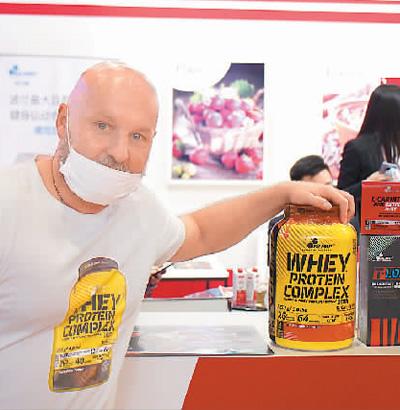Sugar-free drinks, sugar-free moon cakes, and sugar-free snacks are selling better and better-
"Zero Card No Sugar": a new fashion for consumption upgrade
On September 28, the 21st China International Food and Beverage Exhibition opened in Shanghai.
The picture shows exhibitors promoting sports health food.
Photo by Xinhua News Agency reporter Ren Long
"How sweet is your milk tea?" This is a sentence often heard in milk tea shops today.
Three-point sweet, no additional sugar, and zero-calorie sugar substitutes have become the choice of most customers.
Behind this phenomenon is that zero-calorie, low-sugar, and no-sugar are gradually popular in the consumer field.
"Almost all of my friends prefer sugar-free beverages. I basically choose not to add sugar when ordering milk tea." Xiao Li, a Beijing girl, is an office worker who sits in the office for more than 8 hours a day.
"Due to work reasons, I am very afraid that I will gain weight. I choose sugar-free beverages. The calories will not be high." Xiao Li said that sugar-free or sugar-free beverages such as Yuanqi Forest, Zero Coke, and Hey Tea are very popular this summer. It can be said that it accurately meets the consumer needs of most young people today.
Such enthusiasm feedback is on the financial data of some sugar-free beverage products.
In the first half of this year, Yuanqi Forest’s revenue exceeded 800 million yuan, close to the level of last year, and it surpassed Coca-Cola in Tmall’s "6.18" to become the first place in the water and beverage category.
Driven by new sugar-free products such as sugar-free black coffee, low-sugar milk coffee, and low-sugar coconut coffee, the recently announced Nongfu Spring’s first semi-annual report after its launch showed that the revenue growth of Nongfu Spring’s new products increased by 210.3% year-on-year.
According to Zhiyan Consulting's "China's Sugar-Free Beverage Industry Market Supply and Demand Status Quo and Development Trend Forecast Report from 2020 to 2024", as the market penetration rate of sugar-free beverages continues to increase, its growth rate has been much higher than the overall growth rate of beverages.
Data shows that on an e-commerce platform, the sales of sugar-free beverages in May 2020 reached 59 million yuan, an increase of 210% year-on-year.
Catalyzed by the new demand, a large number of manufacturers have rushed to the beach.
Since February, Yili has launched Yiran Dairy Mineral Sparkling Water; unified launch of new tea beverages called "Tea Ba"; Nestlé's sub-brand "Uhuo" launched new sparkling water products; Wahaha's beverage brand KellyOne also launched a new product called "Angry Bobo" sparkling sparkling water.
In addition, Yinlu, Master Kong, Nongfu Spring and other beverage companies have successively launched new sugar-free products.
The follow-up of the brand has led to the prosperity of the sugar-free beverage market.
The popularity of sugar-free beverages reflects the consumption philosophy of most young people who pay more attention to health.
Under the guidance of this concept, low-calorie meals, meal replacements, light fasting and other dietary methods continue to emerge, reflecting the new trend of consumption upgrades.
According to the recently released "Alibaba 2020 "October" Holiday Consumer Travel Trend Report", this year's "October" coincides with the Mid-Autumn Festival, and moon cake sales have skyrocketed. Sugar-free, low-calorie moon cakes are for consumers who want to taste delicious and want a good figure. The reader got rid of the hunger, and searches for sugar-free mooncakes in September rose nearly 50% year-on-year.
What is the underlying logic of the popularity of the sugar-free low-calorie diet?
From the perspective of the external environment, the "Healthy China Action (2019-2030)" previously issued by the National Health Commission advocated that by 2030, the per capita daily intake of added sugar should not be higher than 25 grams.
Under relevant advocacy guidelines, the sales of sugar-free beverages in 2019 increased by more than 10% year-on-year, far higher than the overall growth rate of beverages.
From the perspective of internal demand, today's "post-90s" and "post-00s" pay more attention to health preservation, which has led to the trend of healthy eating.
Industry insiders pointed out that the artificial sugar substitutes used in some sugar-free beverages were rumored to be harmful to the human body. In recent years, a number of natural sugar substitutes have dispelled consumers' worries to a certain extent. "Sugar-free" healthy and delicious new-style tea is sought after.
Many experts believe that under the guidance of the concept of health, the consumption potential of "zero-calorie and sugar-free" is huge, and the sugar-free diet market will be "full of vitality" in the future.
At the same time, this requires brands to proactively adapt to the consumption upgrade trend, and perfectly combine "tastier" with "healthier".
Kong Dechen

